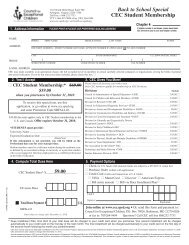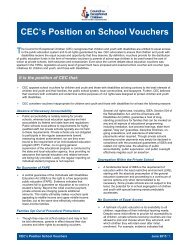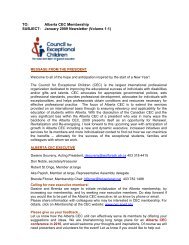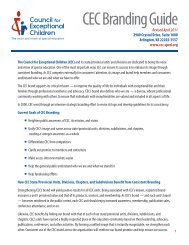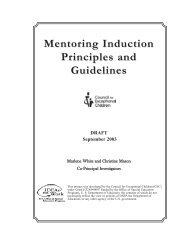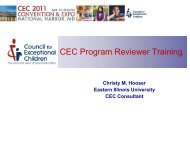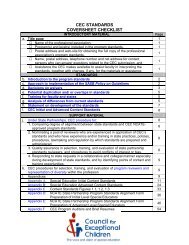What Every Must Know Special Educator - Council for Exceptional ...
What Every Must Know Special Educator - Council for Exceptional ...
What Every Must Know Special Educator - Council for Exceptional ...
Create successful ePaper yourself
Turn your PDF publications into a flip-book with our unique Google optimized e-Paper software.
Appendix 10: deVeloping A per<strong>for</strong>mAnCe-BASed progrAm<br />
ASSeSSment SyStem<br />
Joni L. Baldwin<br />
University of Dayton<br />
Carol A. Long<br />
Winona State University<br />
The special education preparation program per<strong>for</strong>mance<br />
assessment system is designed to document<br />
that teacher candidates have mastered the knowledge,<br />
skills, and dispositions necessary <strong>for</strong> teaching students<br />
safely and effectively with exceptional learning needs.<br />
While challenging, it can also be a highly rewarding<br />
and a powerful incentive <strong>for</strong> program improvement.<br />
This article describes the basics <strong>for</strong> developing and<br />
implementing the program-wide per<strong>for</strong>mance assessment<br />
process with an eye on NCATE unit review.<br />
Elements of a Successful Per<strong>for</strong>mance-<br />
Based Assessment System<br />
understand the 6 to 8 Assessment Rule<br />
Several years ago, NCATE joined in a collaborative ef<strong>for</strong>t<br />
with its specialty professional association partners<br />
(SPAs) to develop a process by which all teacher education<br />
programs could document candidate learning<br />
<strong>for</strong> program recognition with not more than 6 to 8 program-wide<br />
assessments. Under the new procedures,<br />
six program-wide assessments are required by all<br />
programs, with specific types of assessments specified<br />
<strong>for</strong> the first five.<br />
Licensure assessment or other content assessment:<br />
most frequently this will be the state mandated Praxis<br />
II. It may also be a state developed assessment, or<br />
use of a commercial tool such as an NES assessment.<br />
The assessment must be aligned with CEC standards<br />
to document that the content of the test does address<br />
CEC standards (Required).<br />
Content assessment: The content assessment is an<br />
assessment that documents candidates have the<br />
content knowledge necessary to teach students with<br />
exceptional learning needs. This can be any type of<br />
assessment, such as a research report, child study, or<br />
an essay (Required).<br />
Assessment of planning: This assessment needs to<br />
demonstrate that the teacher candidate documenting<br />
pedagogical and professional knowledge, skills, and<br />
dispositions can plan, taking into consideration all<br />
variables of the students and content to be taught<br />
(Required).<br />
Student teaching/internship assessment: aligned with<br />
CEC standards (Required).<br />
Assessment of candidate impact on student learning:<br />
This assessment must document that the students<br />
learned what the candidate was teaching. This could be<br />
the assessment plan and results from the unit planned<br />
in Assessment 3 (if it actually is a different assignment<br />
and/or grading template), a behavior change project,<br />
or a case study.<br />
Final Required Assessment: The last required assessment<br />
is of the faculty’s choosing to document missing<br />
standards or to clarify specific program standards.<br />
Once the six assessments are determined, the faculty<br />
may choose up to two additional assessments to document<br />
a missing standards area (Optional).<br />
To be considered program-wide, the assessment must<br />
be required of all teacher candidates in the program.<br />
For example, if a behavior change project, based in a<br />
course only some of your candidates take, it is not a<br />
program-wide assessment and cannot be used as such.<br />
Typically, the six-to-eight program-wide assessments<br />
each cover several CEC standards. However, faculty<br />
should decide which standards are an assessment’s<br />
primary focuses. While it is possible an assessment<br />
to touch on each CEC Standard, the faculty should<br />
review the assessments carefully to determine which<br />
standard(s) are best represented.<br />
Program Standards<br />
The common core and applicable specialized program<br />
standards must be addressed <strong>for</strong> all initial licensure<br />
teacher candidates. For example, <strong>for</strong> categorical programs,<br />
such as an Early Childhood <strong>Special</strong> Education<br />
licensure program, the Early Childhood specialty standards<br />
must be addressed as well as the Initial Common<br />
Core. The same is true <strong>for</strong> any other categorical preparation<br />
programs (i.e., Learning Disabilities, Deaf and<br />
Hard of Hearing, Physical and Health Disability). The<br />
specific standards <strong>for</strong> each category must be addressed.<br />
For multi-categorical, or non-categorical programs, the<br />
Individualized General Education standards (<strong>for</strong> mild/<br />
moderate programs), or Individualized Independence<br />
Appendix 10: developing A per<strong>for</strong>mAnCe-BASed progrAm ASSeSSment SyStem 283



